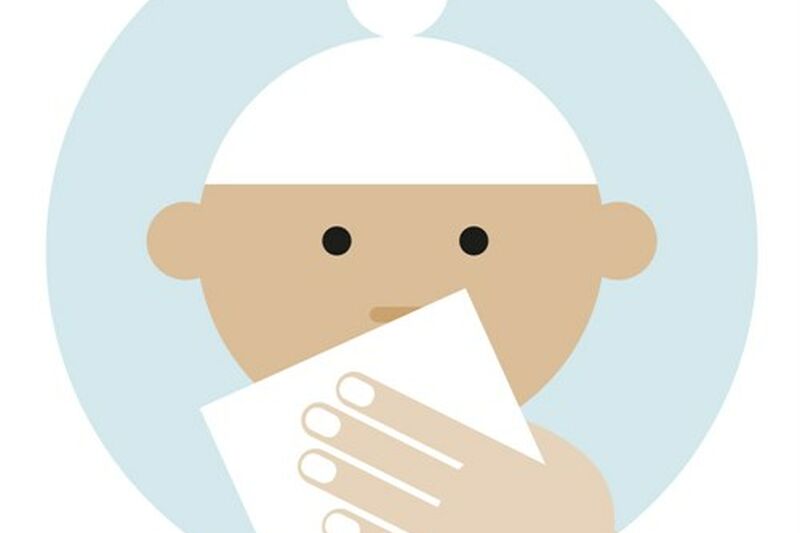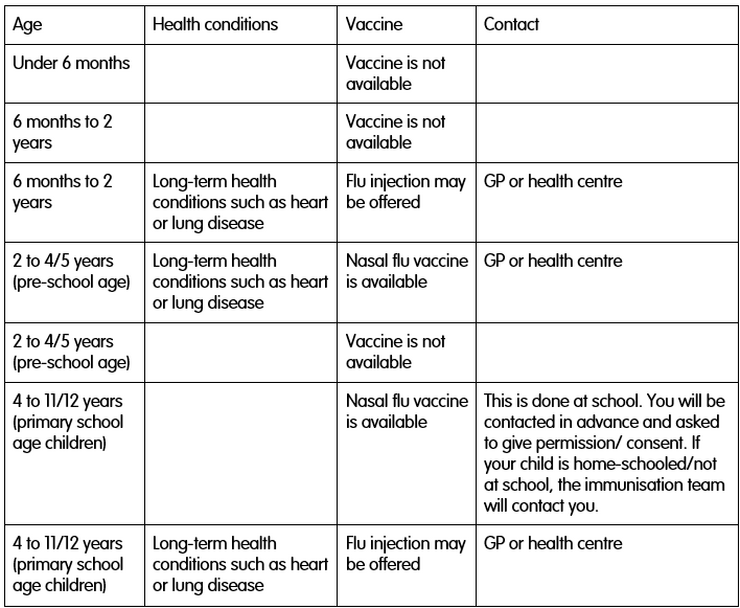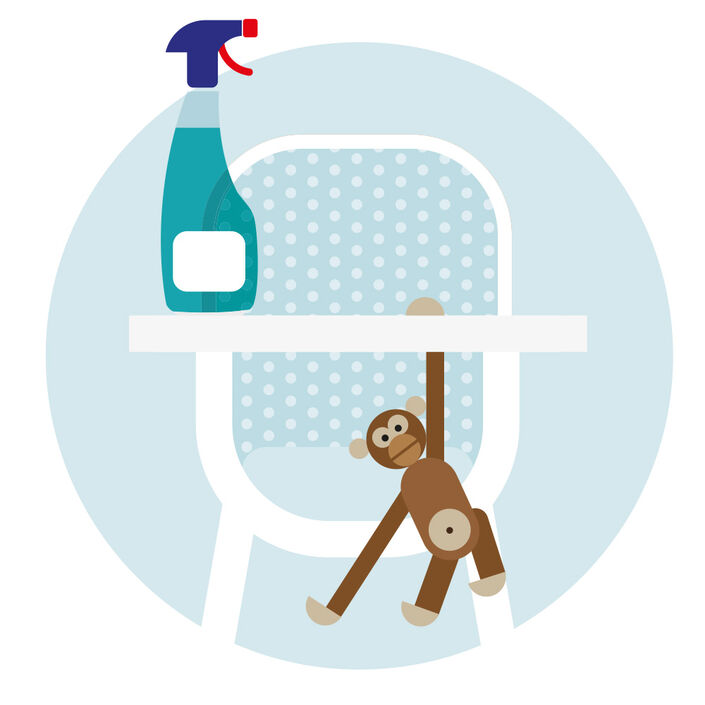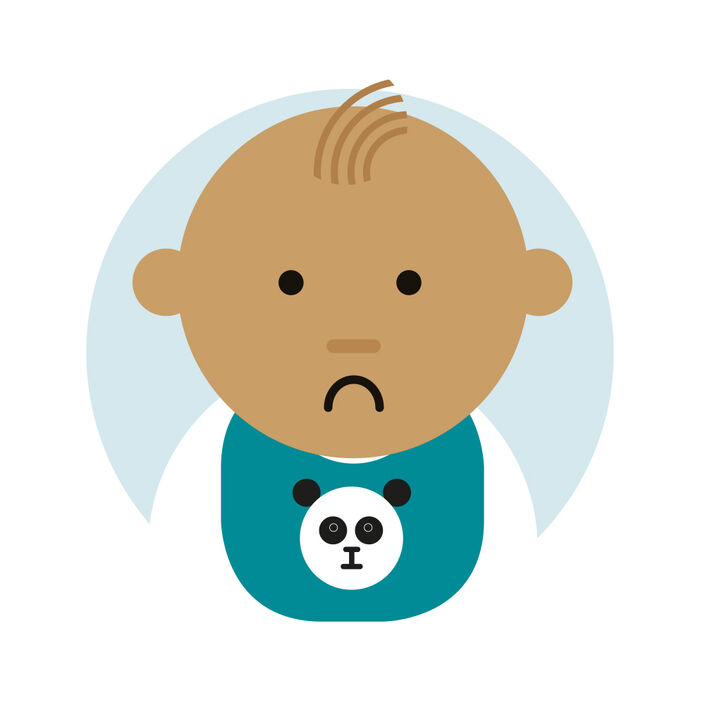Vaccine availability information can also be found on the NHS website.
If you are not sure if your child needs the vaccine or have concerns over the health of your child, you should always talk them through with a medical healthcare professional such as your health visitor or GP. They will be able to advise on what is best for your child.
Flu season tends to peak in January or February but can continue through spring. Vaccines can offer some protection into the next season too so it is still worth having a vaccination in sprin
It’s common to get the flu more than once, so try to avoid taking your baby to crowded places during the winter months and wash your hands often and thoroughly.
See our page about reducing the risk of infection
for more tips on protecting your baby.
When to call your GP or NHS 111
If you think your baby might have flu, a fever (a temperature above 38C), or you are concerned at all, you should call your GP or NHS 111.
If your baby or child has chest pain, difficulty breathing, or starts coughing up blood, call 999 or go to your nearest hospital’s Emergency Department (A&E). You can find your nearest Emergency Department on the NHS website.
Pneumonia is an infection of the lungs causing the tissue to swell and the air sacks to fill with fluid, making it harder to take in oxygen. It can take hold after a cold, flu or other illness, and can be caused by bacteria, viruses or fungi.
What are the symptoms?
Signs of the infection can appear over a day or two, or can develop more slowly. The symptoms can include:
- A fever
- A cough
- Rapid breathing
- Breathing difficulties
- Pain or discomfort in the chest
- Your baby could also show signs of feeling generally unwell, like not feeding as usual
How you can help
You should see your GP if you think your child has pneumonia. Some cases can be treated at home with antibiotics if the GP believes bacteria has caused the infection. But high risk babies might need a short stay in hospital to help with their breathing. The Hib vaccine included in the 5-in-1 injection, and the pneumococcal (PCV) vaccine, are both given to babies at eight weeks. These injections can protect against some types of pneumonia.
When to call your GP
Call your GP if your baby shows any of the symptoms listed above, or appears to be sleepier than usual. If your baby has any trouble with breathing, you should contact your GP immediately.
Bronchiolitis is the swelling of the small airways in the lungs, caused by infection. This leads to a build-up of mucus, causing breathing difficulties. It is a common illness that affects babies and young children. It is often caused by a cold virus or an infection called Respiratory syncytial virus (RSV).
Many adults, children and babies catch RSV and have very similar symptoms to that of a cold. In fact, in most cases you would not know whether your illness was caused by this virus, or many of the other viruses which cause similar symptoms.
See our page for more useful information about bronchiolitis.
Respiratory Syncytial Virus (RSV) is a common virus that causes cold-like symptoms. It is very contagious and passes easily between people through hand contact or in droplets produced by coughing and sneezing.
It’s known to infect almost all children by the age of two, and often parents will not know that the colds and sniffles their baby is experiencing are caused by RSV.
RSV can lead to bronchiolitis, a viral chest infection that makes the small airways in the lungs swell. This leads to a build up of mucus, causing breathing difficulties.
Some babies and children are at higher risk of serious illness with RSV and bronchiolitis including:
- Babies born premature
- Infants with a heart or lung condition such as chronic lung disease
(bronchopulmonary dysplasia)
- Those with a weakened immune system.
If your GP or consultant thinks your baby is at higher risk of severe illness following an RSV infection, they may offer a monthly antibody injection (palivizumab). This has proved effective at protecting against severe infection and reducing hospitalisation.
For more information, visit our webpages on RSV and bronchiolitis.
Pneumonia is an infection of the lungs causing the tissue to swell and the air sacs to fill with fluid, making it harder to take in oxygen. It can start after a cold, flu or other illness, and can be caused by bacteria, viruses or, very rarely, fungi.
What are the symptoms?
Signs of the infection can appear over a day or two, or can develop more slowly. The symptoms can include:
- A fever/high temperature (a child's normal temperature is around 36.4C. A fever is a temperature higher than 37.5C).
- A cough
- Rapid breathing
- Breathing difficulties
- Pain or discomfort in the chest
- Your baby could also show signs of feeling generally unwell, like not feeding as well as usual.
How you can help
You should see your GP if you think your child has pneumonia. Some cases can be treated at home with antibiotics if the GP believes bacteria has caused the infection.
High risk babies might need a short stay in hospital. They will be given oxygen to help with their breathing, antibiotics to fight the infection, and fluids to help with dehydration.
The Hib vaccine included in the 5-in-1 injection, and the pneumococcal (PCV) vaccine, are both given to babies at eight weeks. These injections can protect against some types of pneumonia.
When to call your GP or NHS 111
Call your GP if your baby shows any of the symptoms of pneumonia listed above, or appears to be sleepier than usual.
If your baby has any trouble with breathing or is feeding less well than usual, you should contact your GP or NHS 111 immediately.
There are lots of common stomach bugs, including norovirus and rotavirus. Hundreds of thousands of people catch these infections every year.
You may have heard norovirus described as the ‘winter vomiting bug’ because the illness is more common in winter. However, stomach bug viruses can be caught at any time of the year.
They are highly contagious, meaning they can spread to other people quickly through close contact, touching objects with the virus on them, or eating food prepared by someone with the virus.
What are the symptoms?
Norovirus, rotavirus and other stomach bugs cause vomiting (being sick) and diarrhoea (liquid poo). This can come on very suddenly. Other symptoms include a fever, headaches and painful stomach cramps.
How you can help
These viruses are particularly infectious, so if you or anyone else in your family becomes ill, follow our tips for reducing the risk of infection to help avoid it spreading.
Washing hands frequently and carefully with soap and water is essential. Alcohol hand gels do not kill norovirus. Avoid close contact with anyone that has been sick or had diarrhoea recently until they are fully recovered.
There is no specific cure for these viruses, so you will have to wait until the sickness and diarrhoea passes. It should not last more than a couple of days.
You can usually care for your baby at home, making sure that they keep drinking plenty of fluids.
Very young babies, especially those at higher risk, are more likely to become very poorly from stomach infections. If you are worried, you should always contact your GP.
Extra care should be taken to prevent babies and small children who are vomiting or have diarrhoea from dehydrating.
If your baby is eating solid foods and they feel like eating, try to give them foods that are easy to digest such as soup, rice, pasta and bread.
A rotavirus vaccine is offered to babies at eight and 12 weeks, along with their other vaccines. See our Vaccinations section
for more information.
When to call your GP or NHS 111
Contact your GP or NHS 111 for advice if:
- Your baby’s symptoms last longer than a few days
- They have blood in their poo
- They have a serious illness that might be made worse by their symptoms
- If they aren’t drinking as much as usual.
If the symptoms are particularly bad, or you are worried, you should always seek professional medical help.
Strep A, also called ‘Group A strep’, ‘Group A streptococcus’ (GAS) or ‘a Group A streptococcal infection’ is a common type of bacteria that can cause infections such as scarlet fever. Rates of infection are usually highest in winter and spring.
Babies born premature or sick are not considered to be more vulnerable to this bacteria, but it can lead to serious illness and we recommend that you seek medical advice if you think your infant has strep A.
Visit our page on strep A for more details.



